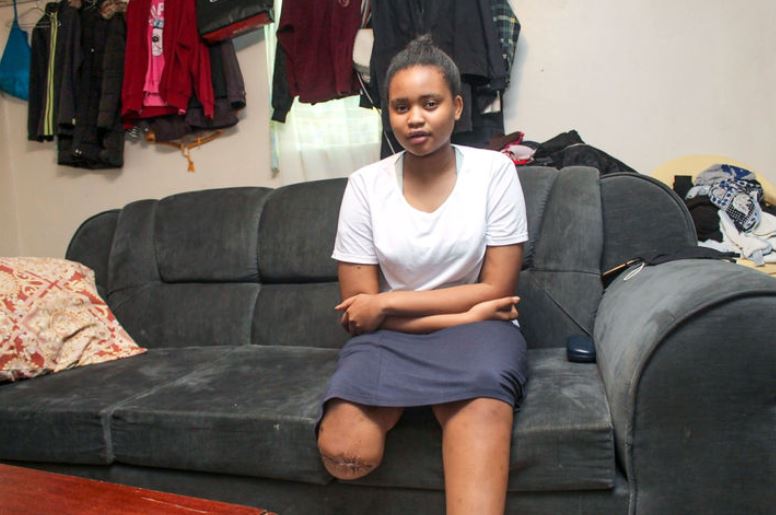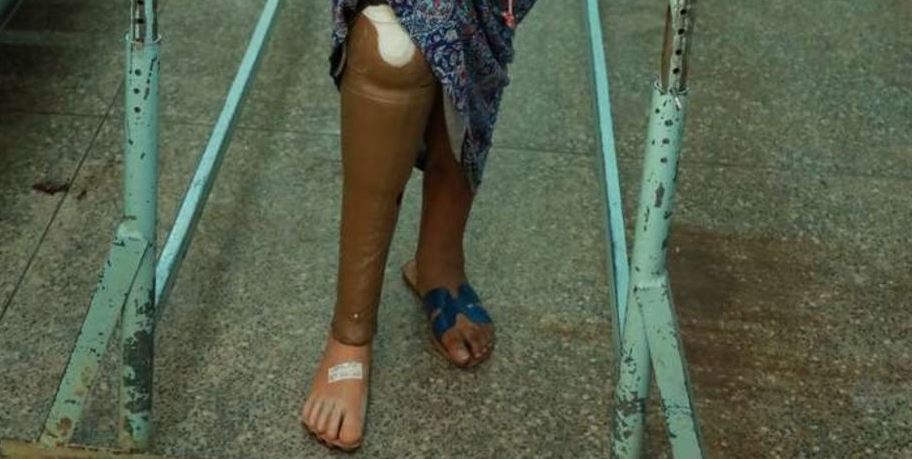 Victoria Mbuki was one of three survivors in a road accident that claimed 11 lives in November 2019. She, however, did not escape unscathed as her right leg had to be amputated, not once but twice.
Victoria Mbuki was one of three survivors in a road accident that claimed 11 lives in November 2019. She, however, did not escape unscathed as her right leg had to be amputated, not once but twice.
Mbuji, a form four student, sees her amputation as a blessing in disguise and hopes to voice the plight of amputees in Kenya after her high school education.
She shared her story with Saturday Magazine.
“I’m yet to come to terms with the accident I was involved in last year, the past month or so has been sort of bearable, especially with the support I have received from many people.
But I must admit that perhaps I was a little naive to think that this would be easy. The state of my physical condition dawned on me when I walked into the center and saw many people with the same situation as mine, and I thought to myself, God, I’m really an amputee. This got me a little emotional.
Also, the thought of getting a new limb scares me a little. I had already gotten used to having one limb, and though I am thankful for the prosthetic leg I have received, I know it will take some time to get used to. An organisation, Jaipur Foot Trust Artificial Limb Center got in touch after my story was published and gave me a prosthetic leg for free.
I won’t walk normally as I used to, but my mobility though slow, will be restored, and for me, I couldn’t be more thankful.
Just a recap of what happened to me. On November, 10th 2019, I was involved in a matatu accident at around 9 am, as I headed to the CBD from Utawala. I was to attend a mass service at St. Peter’s Clavers church. I then found myself in the casualty ward at Kenyatta National Hospital. The matatu I was in had been involved in a head-on collision with a lorry, and I was one of only three survivors, in the accident that claimed 11 souls. Consequently, my leg was amputated.
After months of recovery, I went back to school, then schools closed due to Corona. As a form four student, I was part of the students recalled recently. Back at school and with the Corona pandemic, not many activities are going on. I don’t go out much. You’ll find me in the class, dormitory, or the dining hall.
Other than that, I don’t mingle as much with students from other classes. I spend most of the time with my classmates, and their support has been out of this world.
If we are going to and from class or heading to the laboratory, there’s always someone carrying my books. My school has also been supportive. In the laboratory where activities require mostly standing, I’m allowed to sit and everything I require for every procedure is set at my sitting level.
School support
I’ve been lucky that the school has set aside a bathroom and toilet specifically for me, which makes it easier for me instead of having to wait in line with other students.
But in terms of studies and what is required of me as a student, nothing has changed. I am still expected to put in the same effort in my studies, just like any other student.
In fact, right now I find myself working even harder than before. For instance, I wake up at 4 am as others wake up at 5 am, so that I can make it to the morning preps by 5. 30 am. I have never been late.
Away from classwork, the principle has made my life much easier in other ways. She goes out of her way to ensure that I am comfortable. She takes me for walks within the school just to have me relaxed and for some bit of exercise.
However, I would be lying to paint everything as rosy, because it hasn’t been easy. Yes, I have got over the fact that I was involved in an accident, and I cannot change the hands of time, but accepting the situation will take time. Acceptance is a process.
Motorphobia
I also haven’t got over my motor phobia. A fear of driving or being in a car is a type of phobia that results in persistent and intense fear of driving or riding in a vehicle.
I still get these thoughts that I will be involved in another accident. In fact, I don’t know if I’ll ever get over the fear of boarding matatus.
On the brighter side, I feel honoured to have shared my story, and hopefully, it has inspired many people with the same condition as I am facing.
As far as finding a support system, I must say that in Kenya we’ve got a long way to go when it comes to offering psychological and mental help for people living with disabilities, and particularly those who face this tragedy late.
The gaps
In Kenya, rarely do amputees come out and speak openly about their experiences. I had to depend on encouragement and advice from foreign amputees on YouTube channels.
This has given me a push and I want to be the one to voice the plight of amputees in Kenya, through my experience.
I intend to start this project immediately after I complete high school, (After May 2021), to give people hope by showing them that I didn’t let my situation dampen my dreams.
I want to show the world that I can achieve even more dreams than I had before my leg was amputated. I see this as a blessing in disguise.”
Read more on Victoria’s story here.







